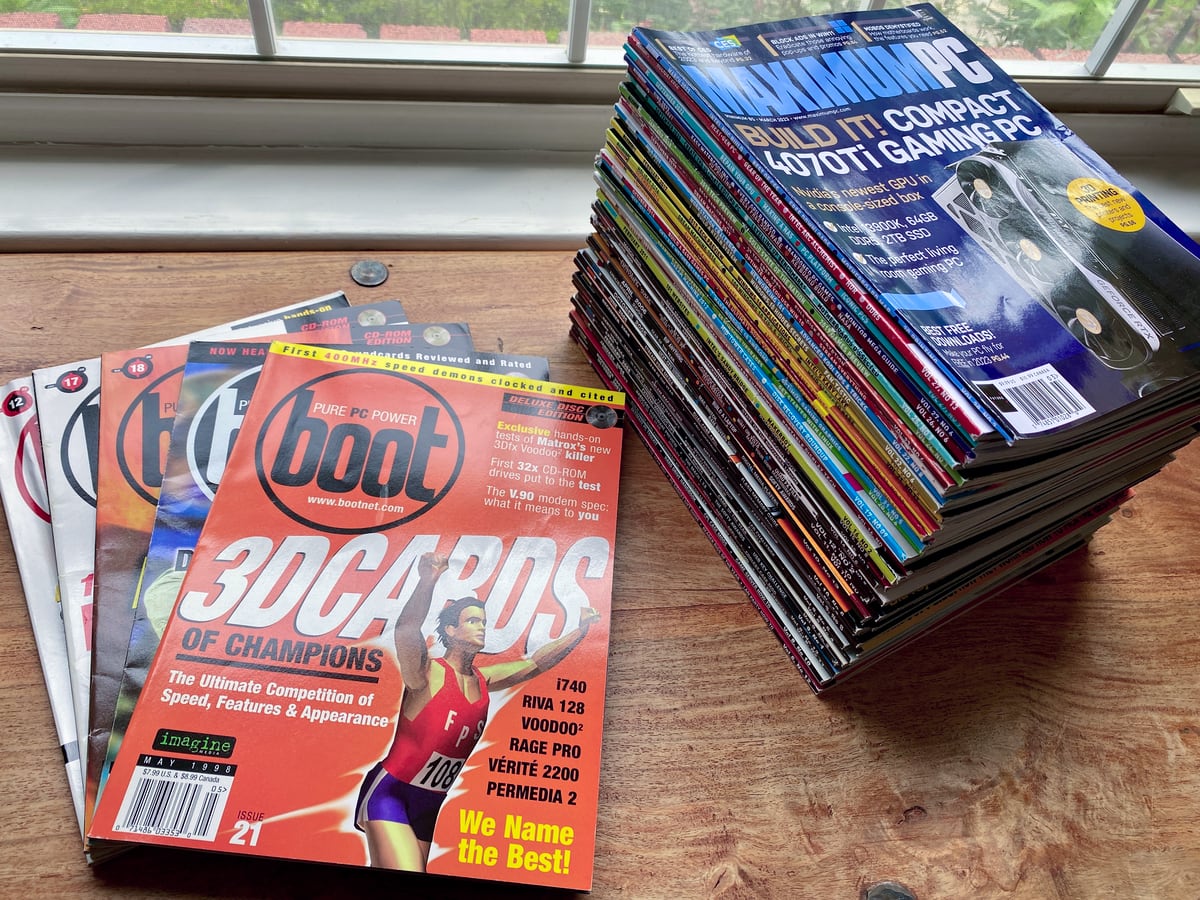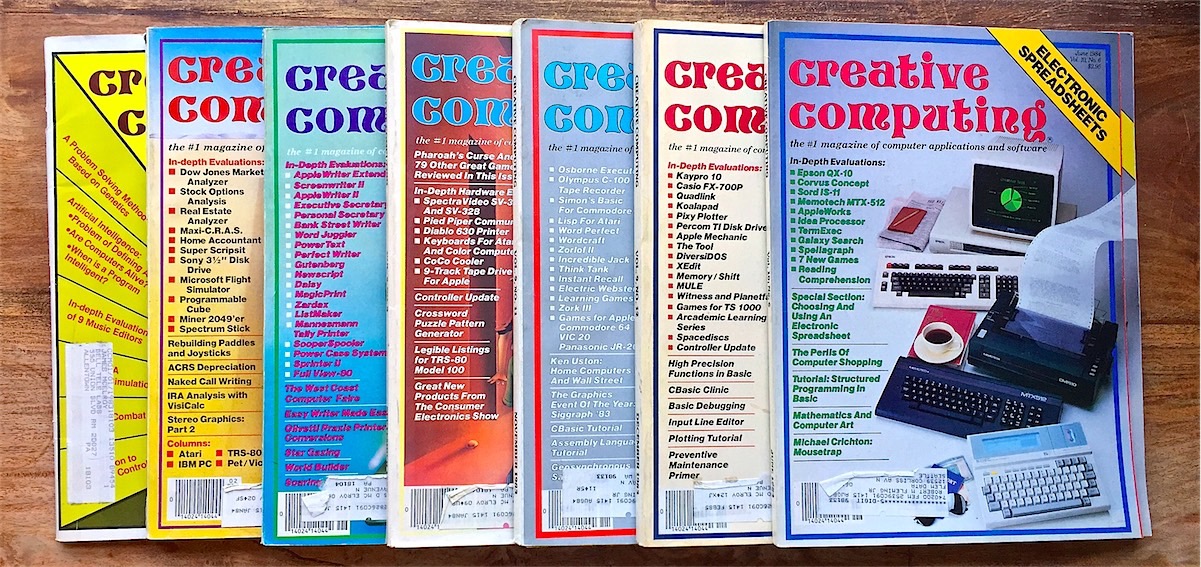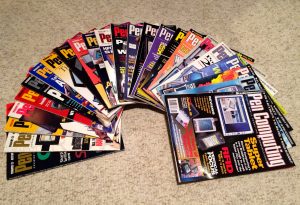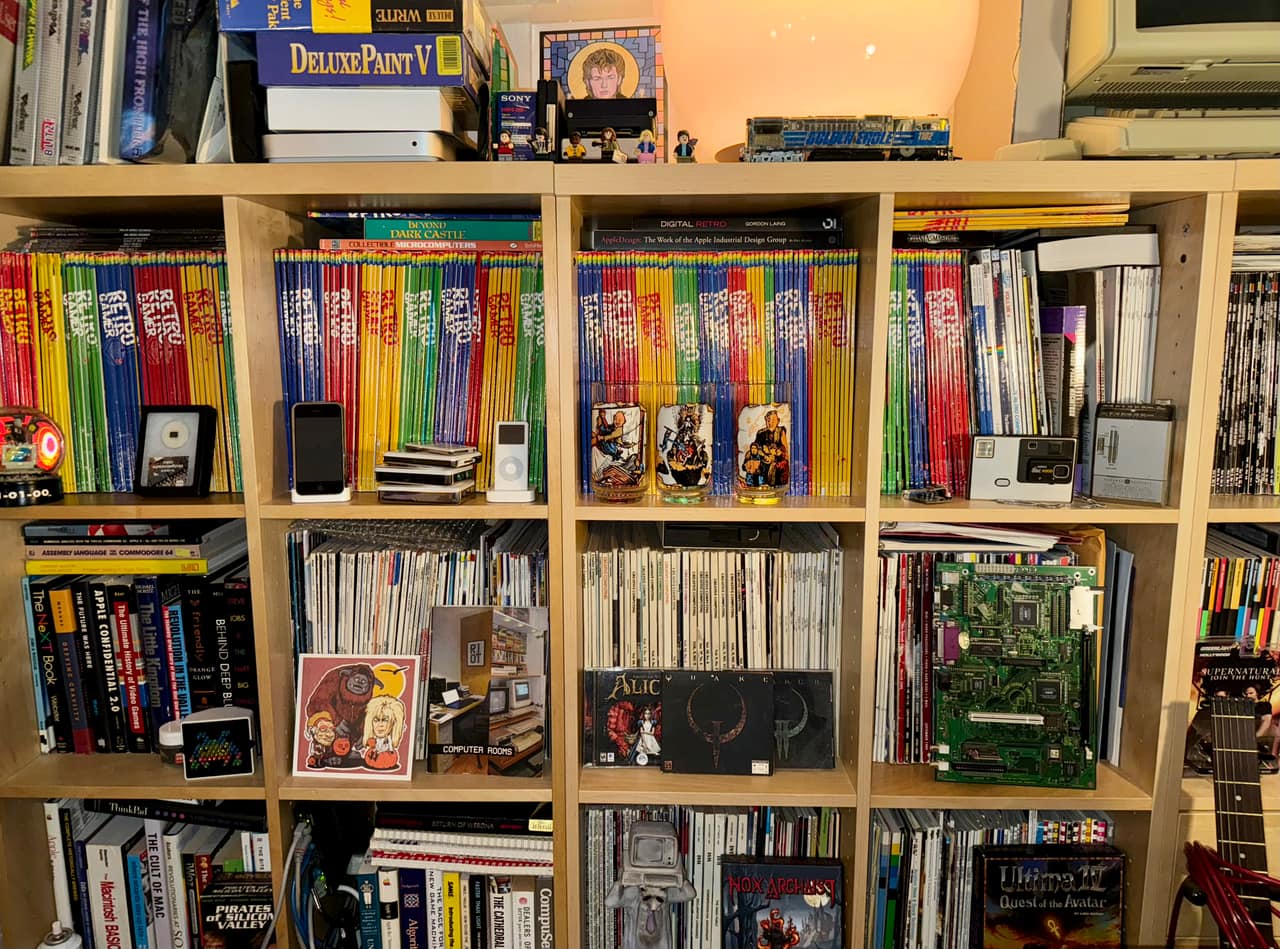
I’ve been buying a copy of Maximum PC magazine at the airport newsstand on every long-distance trip I’ve taken over the past two decades. I’m primarily a Mac user but Maximum PC, which started life as boot, bought at these intervals kept me comfortably up to date on the state of affairs in the PC hardware world (not to mention making for a nice timeline of my significant travels). Thumbing through these issues a few times a year, I got an overall feel for what was the state of the art in PC CPUs, GPUs, motherboards, RAM technology, and so on. I’ve got all of these issues over there on the shelf, handy to look back on when trying to assess this or that mildly-vintage system that might come my way.
But, when I flew to Boston this spring, I couldn’t find my copy of Maximum PC on the newsstand. It wasn’t at Washington National or at Logan, on either end of the week-long trip. A few days later when I was back in town, I checked the local Barnes and Noble for the current issue and wasn’t able to find it there, either.
It was then that I did a bit of searching on the web and was rather alarmed to find Harry McCracken’s recent Technologizer post, “The End of Computer Magazines in America,” subtitled “With Maximum PC and MacLife’s abandonment of print, the dead-tree era of computer journalism is officially over. It lasted almost half a century—and was quite a run.” I somehow didn’t see this coming nearly as well as I should have and I very much lament that the April 2023 issues of both of the aforementioned magazines’ were there last.

Ever since I got my first home computer on Christmas morning, 1982, I have been buying and reading computer magazines. Some general — Creative Computing, BYTE, Compute!, Personal Computing, Computers & Electronics, Pen Computing, Next Generation, etc. — and some platform specific — A+, InCider, ’99er, AmigaWorld, STart, INFO 64, NeXTWorld, etc. — these magazines riveted me with the promises of upcoming software, hardware, new systems, and the like in a world before the internet when monthly magazines like these were how we knew what was coming. They were what got me excited about the Next Big Thing.
And now, basically all American computer print magazines have vanished. Some have gone online in various fashions…but it’s not the same. Coming to realize that this reality had crept slowly upon me was a sad moment.

It is the case that the British computer magazine business is still rolling along, to some degree. Indeed, I have been a subscriber of Retro Gamer magazine since it started up in 2004 and it has taught me most of what I know about the ZX Spectrum, BBC Micro, Amstrad CPC, and other British machines of the sort. (I was featured in issue 148, in fact.) But, the systems that were in use here in the U.S. and those that were in use across the pond — especially early on in the home computer era — differed notably, and it is the American magazines that formed my notion of the computing industry relevant to me as a whole.
I am glad to have saved what magazines I did (though sadly most I let go, sold with various systems as I moved from one to the next) and to have acquired some here and there since beginning my vintage computer collection. I still flip through those old magazines from time to time, which is a part of my vintage computing hobby that I quite enjoy. But, it seems my magazine shelves are unlikely to find themselves much more burdened, now that this era of computing history has drawn to a close.


Pingback: 美国计算机杂志时代已经结束 - 偏执的码农
I love magazines as well not just PC ones, nothing like buying one on a long trip and becoming an expert on a particular subject, and being able to have a 30 minute conversation with anyone
Your comment about magazines being an instant crash course on long trips resonates with me! I remember diving into ‘The Economist’ and coming out feeling like a mini-expert in global affairs. Magazines like these, whether it’s about PCs or global economics, create a unique bubble of learning that’s hard to replicate digitally.
If you happen to be around Atlanta, check out the Byte Magazine display (“collection”) at The Computer Museum of America, curiously in Roswell, Georgia.
https://www.computermuseumofamerica.org/exhibits/
It is an interesting place.
I would checkout getting a subscription to the hacker quarterly.
https://www.2600.com/
a great computing magazine. But I get what you mean by it being the end of an era, you can really struggle to find good computing magazines just around now adays.
Although not generalist computer magazines, we still do publish computer magazines, including Linux Magazine, ADMIN, and MakerSpace.
You can find an overview here:
https://shop.linuxnewmedia.com/shop
Pingback: Hacker Bits, Issue 97 - Hacker Bits
The main difference is the America magazine business (with a few exceptions) needs subscribers to sell advertising … and it’s a circular cycle – fewer subs means fewer ads which means fewer pages and fewer ads and fewer readers which means more advertisers abandoning that magazine. In the heyday of American mags (1960’s to 2000’s), 90% of readers were subs – news stand sales and covers only serve to draw in new readers, nearly all mags sent to news stands were returned/pulped (the exceptions were the tabloid ones at the checkout and People/US did fine at checkout but still mostly counted on subs). British mag sales are virtually ALL news stand sales so they could stay round even if they sold a few thousand issues while in the US, in a giant country, that is not going to cut it …
I did have magazines that went back to 1970s. However, I lost them due to mice…